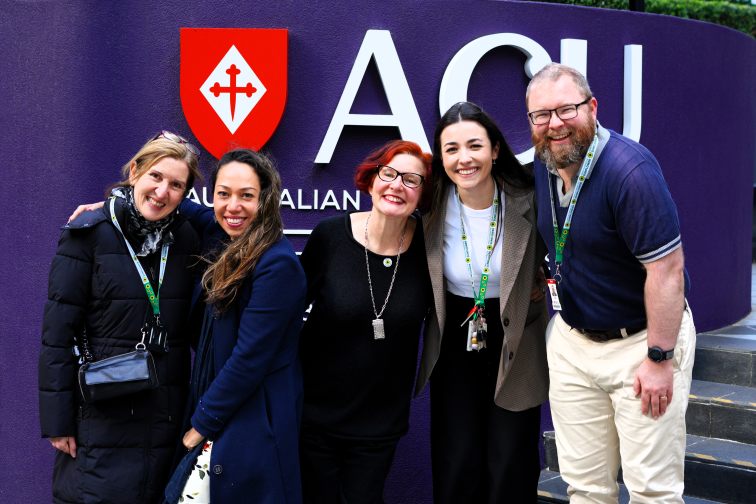Let a thousand (sunflower) blossoms bloom!

ACU Sunflower Champion colleagues standing in front of an ACU banner
In defiance of the colder weather, sunflowers are blooming at Australian Catholic University – but they aren’t in the garden.
They’re on lapels and around collars, and they symbolise something vitally important to the university’s students.
Australian Catholic University (ACU) has recently become a proud member of the Hidden Disabilities Sunflower Program on campus, with staff donning sunflower-adorned lanyards or pins to discreetly show their support for students with invisible disabilities.
The Hidden Disabilities Sunflower Program![]() is a global initiative that encourages awareness and understanding of non-visible conditions, including disabilities and chronic illnesses. It has two parts: one for those with the conditions, and the other for allies, supporters and advocates.
is a global initiative that encourages awareness and understanding of non-visible conditions, including disabilities and chronic illnesses. It has two parts: one for those with the conditions, and the other for allies, supporters and advocates.
People with invisible conditions are able to wear a sunflower to wordlessly share that they have a disability, while allies can wear a sunflower to show that they are equipped with the awareness and knowledge to support the person in whichever way they need – for example, when they need more assistance, understanding or time in a given situation.
Champions of support
At ACU, the Hidden Disabilities Sunflower Program has taken shape in the presence of Sunflower Champions – a group of more than 70 staff members who have come forward and committed to supporting individuals with hidden disabilities. These staff have undertaken specific training to build their knowledge and understanding of hidden disabilities and how they can best support individuals living with a disability. The staff members wear white and green Sunflower Champion lanyards so they can be easily identified by students, visitors or other staff.
Trevor Ianna, National Manager of the Access and Disability Service at ACU, said he had known about the initiative for a couple of years and recognised that it aligned with ACU’s mission and values before proposing to senior management that ACU sign up.
“It was an easy sell because ACU’s mission and values are about upholding the dignity of the human person, contributing to the common good and promoting equity and inclusion. I thought [it was] a great way to promote that equity and diversity across the entire university,” he said.
He began to work on staff buy-in and said there had already been interest in providing more overt support to people with disability on campus – so Trevor devised a system where staff could self-nominate to be Sunflower Champions. These people undertake a program of training from Hidden Disabilities and join a community of practice across ACU’s seven campuses. Champions chat online across campuses and share advice, resources and training – including the Introduction to Disability Awareness ![]() training – to help them in their important role. Some of the Champions also have lived experience of disability.
training – to help them in their important role. Some of the Champions also have lived experience of disability.
Sunflower Champions offer proactive support to individuals on campus who wear a Sunflower themselves. They also act as a point of contact for anyone who wants information or support related to hidden disabilities, and – importantly – promote an inclusion and empathy around the campus.
Sunflower support spreads
Though it was only launched in April, ACU’s Sunflower program has already yielded results. Students have told Trevor that at first, they weren’t comfortable wearing their sunflower to uni because they didn’t think anyone would know what it meant. But with staff openly championing the initiative, these students are now more confident in displaying their own. Having Champions with lived experience themselves makes for a richer experience for those who wear the Sunflower for support, Trevor said.
“Students have already reported back that knowing that the support for people with disability is so overt and visible now has been really empowering to them.”
He added there had been an increase in the number of students wearing Sunflower lanyards since the program’s launch, and a “marked increase” in registrations with the Access and Disability service. Students have told Trevor and his team that they wish they had registered and received adjustments sooner to enable them to thrive in their studies – but that nevertheless, they are happy to feel comfortable enough now to ask for the help they need.
“That kind of feedback from students is so invaluable, and really great to see,” he smiled.
Meanwhile, word is spreading beyond ACU about the floral resource. Other universities have contacted Trevor to ask about bringing it to their own campuses and halls.
Trevor said he has told them all to make sure that they get staff buy-in from the start and embed the idea of Sunflower Champions amongst both academic staff and service staff.
At ACU, he is now working with the Student Association Executive – many of whom have also asked to be Sunflower Champions – to further promote the initiative and general disability inclusion at university events and venues. This includes considering the sensory impact of spaces.
“It’s great to see that all of these little things are popping up, just with the increased awareness around the Sunflower,” Trevor said.
He would like to see more Champions take up the Sunflower mantle, and is actively working on growing the program at ACU’s campuses.
He said the number of Champions is increasing every day, and the university is continuing to promote it not just on campus, but publicly as well. Ideally, Trevor said he would love to see all staff registered as Champions – but ultimately he simply wants all staff to contribute to the accessible and inclusive culture at ACU, to create a “safe and empowering” space.
“That accessibility support and equitable access is part of everything we do,” he said.
Written by: Danielle Kutchel
August 2024

